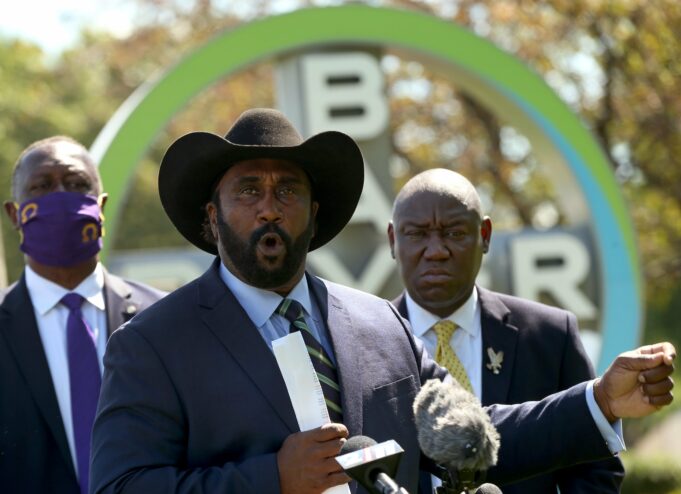WASHINGTON—Black farmers had their hopes up when the Biden administration announced that they would receive $4 billion in loan forgiveness funds allocated as part of the $1.9 trillion Covid-19 pandemic American Rescue Plan. However, those hopes were short lived.
Earlier this year a temporary injunction blocked the allocation of funds for socially disadvantaged farmers and ranchers which has historically included Blacks and Latinos.
To add insult to injury, neither the U.S. Department of Justice nor U.S. Department of Agriculture (USDA) have filed appeals to the growing number of lawsuits by White farmers who allege the relief funds discriminates against them.
Black farmers that have faced decades of discrimination continue to wait for the government to make good on their promises of relief. In response to questions on why no appeal was filed, the USDA told media that the agency would, “continue to forcefully defend our ability to carry out this act of Congress and deliver debt relief to socially disadvantaged borrowers.”
Despite the federal court order halting allocation of desperately needed funds USDA Secretary Tom Vilsack may have the power to release other funds to help struggling Black farmers. But the question is, will he? And given the agency’s documented history of discrimination against Black farmers, what can realistically be expected?
“There’s a billion dollars for outreach and technical assistance,” John W. Boyd, Jr. founder of the National Black Farmers Association, Inc., told The Final Call. “Then there’s $4 billion that’s tied up in the courts. It’s Secretary Vilsack that’s the problem. I didn’t want him to come back to the USDA. We had so many difficulties with him before, moving to take action on issues, just like this, relevant to Black farmers as civil rights issues. He’s too slow,” said Mr. Boyd.

“He’s not the right guy for this time in history. I’m coming right out and say it because there is no reason why he can’t release the monies to help organizations like ours to provide technical assistance and outreach to hundreds of thousands of farmers out here that are waiting. The secretary is at fault,” he added.
The Wisconsin Institute for Law and Liberty filed the lawsuit. Their president and general counsel, Rick Esenberg, said in a statement, “The Court recognized that the federal government’s plan to condition and allocate benefits on the basis of race raises grave constitutional concerns and threatens our clients with irreparable harm. The Biden administration is radically undermining bedrock principles of equality under the law. We look forward to continuing this litigation but urge the administration to change course now.”
The lawsuit represents 12 farmers from Wisconsin, Minnesota, South Dakota, Missouri, Iowa, Arkansas, Oregon and Kentucky protesting the American Rescue Plan Act of 2021.
“Were plaintiffs eligible for the loan forgiveness benefit, they would have the opportunity to make additional investments in their property, expand their farms, purchase equipment and supplies and otherwise support their families and local communities,” the lawsuit said.

“Because plaintiffs are ineligible to even apply for the program solely due to their race, they have been denied the equal protection of the law and therefore suffered harm.”
However, since its inception the relationship between the USDA and Black farmers has been unfair under Democratic and Republican administrations. And under the Trump administration, things became even more bleak.
“Conditions for Black farmers deteriorated under the Trump administration. For example, a Politico analysis by race of 2020 loans helping farmers pay for land, equipment and repairs found that the USDA provided assistance to 71% of white applicants but just 37% of Black applicants. That same year, direct federal loans to Black farmers fell to a 10-year low, from a peak of 945 in 2015 to 460,” wrote Elisha Brown in an Aug. 21 article for Facing South titled, “Stalled U.S. debt relief is the latest broken promise to Black farmers.”
While these recent lawsuits by White farmers play out in court, Mr. Boyd is focused on the outreach and technical assistance funds Secretary Vilsack has control over.
“We need more oversight from Congress asking him why hasn’t he released this billion dollars? What is the hold up? When payments go out to White farmers for subsidies and things of that nature, once they pass Congress and get signed into law by the president, they are in White farmers mailbox with within days. Here we are, this is September we’re heading into October and, the secretary hasn’t released this money,” he argued.
“He’s at fault and he needs to be held accountable and he needs to explain to Black farmers and farmers of color why he’s not doing what he’s sworn into the office to do. He’s supposed to execute all the laws and all that money is not appropriated by Congress. What I didn’t want in the bill is the phrase, ‘at the secretary’s discretion’, all of these measures that pass always used the language, ‘at the secretary’s discretion.’”
What has happened to Black farmers is a classic story of racism. Just two generations away from slavery, by 1910 Black farmers owned more than 16 million acres of land and were close to 14 percent of American farmers. They fed their families, their neighbors and lots of Americans.

Fast forward to today and the “racist dealings” of the U.S. Department of Agriculture’s Black farmers which resulted in several lawsuits now have fewer than 4.7 million acres. Black farms have fallen from 925,000 to fewer than 36,000, according to the USDA’s latest farm census. Today only one in 100 farmers is Black.
Dr. Ridgley Muhammad, manager of Muhammad Farms located on 1,556 acres in Southwest Georgia, questions whether the USDA really wants to help Black farmers.
“When we came up out of slavery, we had 16 million acres. We had 60 towns and in 1923, we had 200 hospitals. So, we were taking care of ourselves. What the USDA did was manipulate and trick the Black farmers. The USDA got Black farmers involved with agribusiness instead of subsistence agriculture. Agribusiness required money to buy equipment. Black farmers often had to borrow money to buy the same equipment,” he said.
“If you borrowed the money but couldn’t pay it back on time, the USDA foreclosed on them, and took their land. The USDA however gave taxpayers money to the White farmers so they could buy the equipment,” added Dr. Muhammad.
Tracy Lloyd McCurty, an attorney and executive director of the Black Belt Justice Center, told Facing South that many Black farmers believe the USDA did not act in good faith on the law’s debt provisions. “There is a very real sentiment amongst the Black agrarian community that the USDA engaged in obstructionism and sabotage by slow-walking the implementation of the debt cancellation provision,” she told the publication. “I think it’s really important to understand that this debt is contested, that it’s racialized, and that it was a tool of oppression to dispossess African American farmers of their farmlands and intergenerational wealth,” added Atty. Brown.
“They tricked us by saying they will give Black farmers some money, right around the election time to make us feel that we should put the Democrats in. They said the Black farmers will get that money. What did they do? All of a sudden, they pop up with all these excuses why the Black farmers won’t get the money. It was all a plan and all a scheme,” said Dr. Muhammad.
—Nisa Islam Muhammad, Staff Writer (Final Call staff contributed to this report.)













